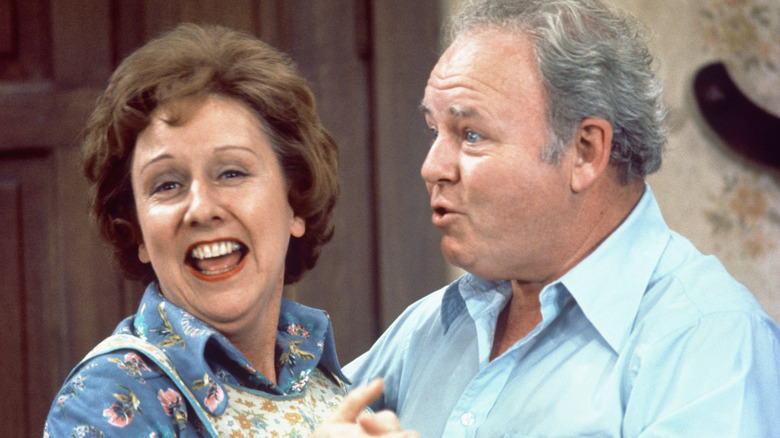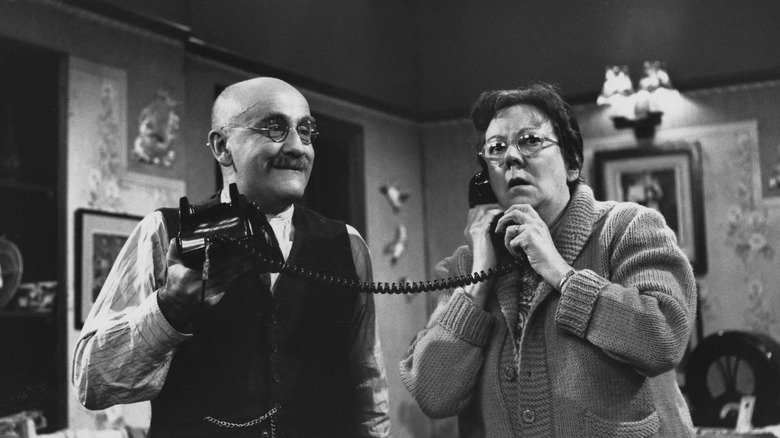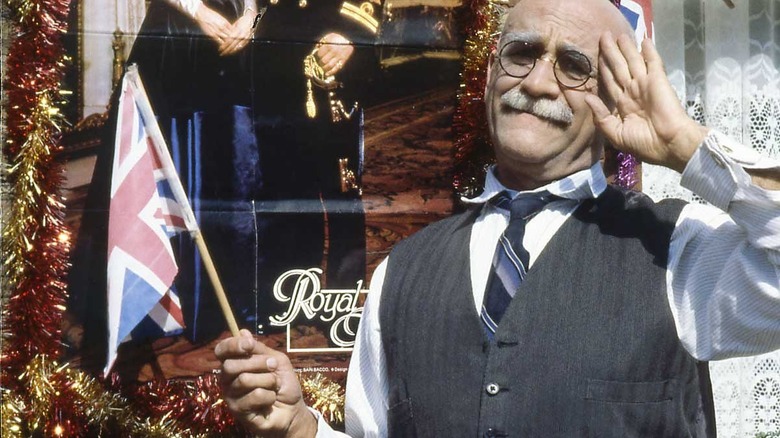All In The Family Was Based On A Beloved British Sitcom
Comedy doesn't always travel well, even between countries like the United States and the United Kingdom; we may share some close cultural bonds and we might speak the same language, but our humor is subtly different. Still, that hasn't stopped TV networks importing popular sitcoms from across the pond and remaking them to suit their respective audiences, with many of the most famous examples heading in a westerly direction for a stateside spin. It's been a mixed bag over the decades: While some are hits, like "The Office" or "Sanford and Son" (based on "Steptoe and Son"), you also have abortive attempts like "The Rear Guard" ("Dad's Army") and "Kings of Van Nuys" ("Only Fools and Horses"). When it works, though, it really works, and one American remake that is arguably better than the beloved British original is "All in the Family."
Norman Lear's groundbreaking show took its basic premise from the BBC's "Till Death Do Us Part." Each episode focuses on a loudly opinionated working-class man and his long-suffering wife, deriving much of its humor and topicality from the cantankerous patriarch's clashes with his daughter and her staunchly progressive husband. In the American version's case, our bigot with the heart of gold was Archie Bunker, played so magnificently by Carroll O'Connor. He was joined in the principal cast by Jean Stapleton as his hard-working but ditzy wife Edith, whom he often called a "dingbat;" Sally Struthers as Gloria, their good-natured but mildly rebellious daughter; and Rob Reiner as Gloria's husband Michael, a serious-minded progressive who is always arguing with Archie.
Debuting on CBS in January 1971, "All in the Family" hit the ground running and topped the Nielsen ratings for five consecutive years, the first American TV show to accomplish the feat. The series was a departure from other cozy sitcoms of the period by zoning in on many hot-button issues, most notably racism, sexism, religion, homophobia, and antisemitism, not to mention some topics that still get short shrift on the telly to this day, such as menopause, abortion, and breast cancer. But for all the serious subjects the show tackled, it always remembered to be funny first and foremost, with superb comic performances that earned numerous nominations and awards for its cast. Let's take a closer look at the British original and how the two shows stack up against each other.
What happens in Till Death Do Us Part?
First airing in July 1965, "Till Death Do Us Part" came from the pen of Johnny Speight, a lifelong socialist who grew up in the traditionally working class East End of London. He evidently wrote what he knew, introducing the British public to Alf Garnett (Warren Mitchell), a loud-mouthed, deeply prejudiced, and perpetually infuriated dock worker living in a poky terraced house with his dour wife Else (Dandy Nichols), his even-tempered daughter Rita (Una Stubbs), and her Scouse Labor-supporting husband Mike (Anthony Booth). Despite their cramped living conditions and lack of money, Alf is a devoted working-class conservative whose two main hobbies are supporting his beloved West Ham United and spouting ill-informed views about politics, race, sex, religion, and anything else that angers him.
Speight's writing was very natural, capturing the rhythms of working-class dialogue, and the show evidently had its roots in the "kitchen sink" realism of the British New Wave movement of the late '50s and early '60s. Much like the United States, Britain was also going through a decade of social and political change, and Speight satirized the contrasting views of people on either side of the generation gap.
The BBC and its viewers had a far more on-off relationship with Alf Garnett and his warring household for almost three decades. Although "Till Death Do Us Part" was hugely popular from the pilot episode onwards, the Beeb grew weary of lawsuits, endless complaints, and frequent clashes with moral guardians like Mary Whitehouse. The show was canceled in 1968 but upgraded to color for a revival between 1972 and 1975, and the Garnetts returned again for the short-lived "Till Death..." in 1981, this time relocated to Eastbourne on the south coast of England. They moved back to London for "In Sickness and in Health" in 1985, by which point Dandy Nichols was visibly frail, and she passed away the following year. The show still ran until 1992 and, although Alf was just as prejudiced as ever, his character was considerably softened to become a lovable old grump. He even got a happy ending, re-marrying and striking rich after discovering a stash of cash hidden in his wardrobe. Warren Mitchell continued to play Alf in his one-man show, but finally hung up his West Ham scarf when Speight passed in 1998.
How do All in the Family and Till Death Do Us Part compare?
"Till Death Do Us Part" and "All in the Family" are fascinating snapshots of their era, and they were both amazingly popular at the time. In Britain, Alf Garnett's off-color rantings regularly drew audiences of around 20 million viewers, including the Queen. (Prince Philip even claimed it was one of her favorite TV programs.) Both shows were also controversial from the start thanks to Alf and Archie's racist slurs, sexist comments, and other contentious language. Flaunting convention at the time, Alf drew regular complaints for uttering the mild swear word "bloody" over 1,400 times in the first seven seasons.
Both shows also raised a more complex issue about how effective satirizing characters like Alf Garnett and Archie Bunker actually is. Speight wanted to reveal people like Alf as "pig ignorant," and his writing skewered the narrow-minded views, blatant intolerance, and muddled hypocrisy of a certain type of working-class Brit, much as Norman Lear did with similar blue-collar bigots in the U.S. The trouble with satire is that it's only successful if you get the joke, and, if you do, the show is likely to be preaching to the converted anyway. Indeed, "All in the Family" has received criticism for validating hardcore conservative viewers who share Archie's opinions, just as Alf has become a kind of folk hero for people who bemoan woke culture and claim to miss those good old non-PC days of British comedy when salt-of-the-earth characters could "tell it like it is."
On a pure entertainment level, I'm loath to say this as a Brit: "All in the Family" is far more enjoyable to watch than "Till Death Do Us Part." I'm a fan of social realism and I appreciate the authenticity of Speight's writing, but many episodes are pretty bleak. The Garnetts' tiny two-up, two-down makes for a cramped arena for much yelling between Alf and Mike, and Alf's relationship with Else is far more abusive than Archie and Edith's. Meanwhile, Archie gets a little blustery and his views are indefensible, but he is nevertheless a far warmer presence than Mitchell's vociferous bully. Perhaps most importantly, "All in the Family" is simply funnier thanks to its more traditional setup/punchline sitcom format. I'm not a big LOL'er when it comes to comedy, but the show regularly makes me chuckle — at Archie, not with him.


